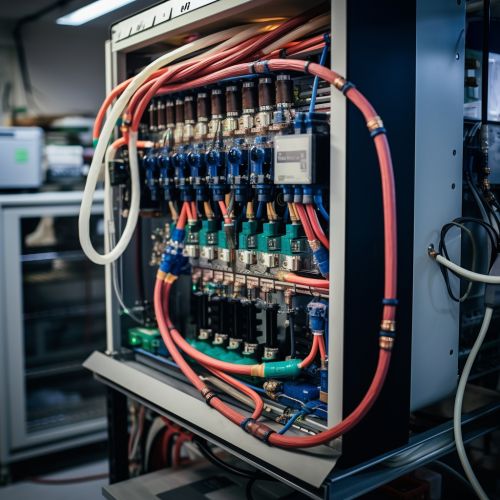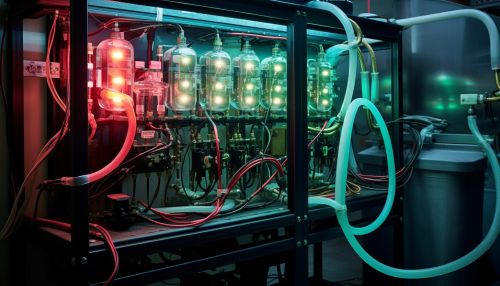Dilution Refrigerator
Introduction
A dilution refrigerator is a type of cryogenic device that provides very low temperatures, typically in the millikelvin range, by employing a mixture of helium isotopes. The refrigerator operates on the principle of quantum mechanical phase separation, which occurs in a dilute solution of 3He in superfluid 4He below a critical temperature. This process is known as the dilution process, hence the name of the device.


Operating Principle
The operation of a dilution refrigerator is based on the thermodynamic properties of the helium isotopes and their mixture. The cooling effect is achieved through the dilution process, where the concentrated 3He atoms in the mixture are diluted by the 4He atoms. This process is endothermic, meaning it absorbs heat from the environment, thus providing the cooling effect.
The dilution refrigerator consists of several key components, including the mixing chamber, the still, the heat exchanger, and the circulation pump. The cooling process begins in the mixing chamber, where the helium mixture is cooled to a temperature below the critical temperature, causing the 3He atoms to become diluted in the 4He superfluid. The diluted mixture then flows to the still, where it is heated to separate the isotopes. The separated 3He is then circulated back to the mixing chamber through the heat exchanger, where it is precooled before entering the mixing chamber again. This cycle is continuously repeated to maintain the low temperature.
Applications
Dilution refrigerators are primarily used in scientific research, particularly in the field of condensed matter physics, where they are used to study the properties of materials at extremely low temperatures. They are also used in quantum computing, where the low temperatures provided by the refrigerator are necessary to maintain the quantum states of the qubits.
In addition to these applications, dilution refrigerators are also used in the study of superconductivity, quantum mechanics, and nanotechnology. They are also used in the calibration of temperature sensors and in the production of ultra-low temperature environments for various experimental purposes.
Advantages and Limitations
One of the main advantages of dilution refrigerators is their ability to provide extremely low temperatures, which are unattainable with other types of refrigeration systems. They also have a large cooling capacity, allowing them to cool large samples or systems. Furthermore, they can maintain these low temperatures for extended periods of time, making them ideal for long-term experiments.
However, dilution refrigerators also have some limitations. They are complex devices that require careful operation and maintenance. They also consume a significant amount of power and require a supply of helium, which is a finite resource. Furthermore, they are relatively large and expensive, making them less suitable for some applications.
Conclusion
Dilution refrigerators are a crucial tool in modern scientific research, enabling studies and experiments at temperatures close to absolute zero. Despite their limitations, their unique capabilities make them an invaluable resource in fields such as condensed matter physics and quantum computing.
